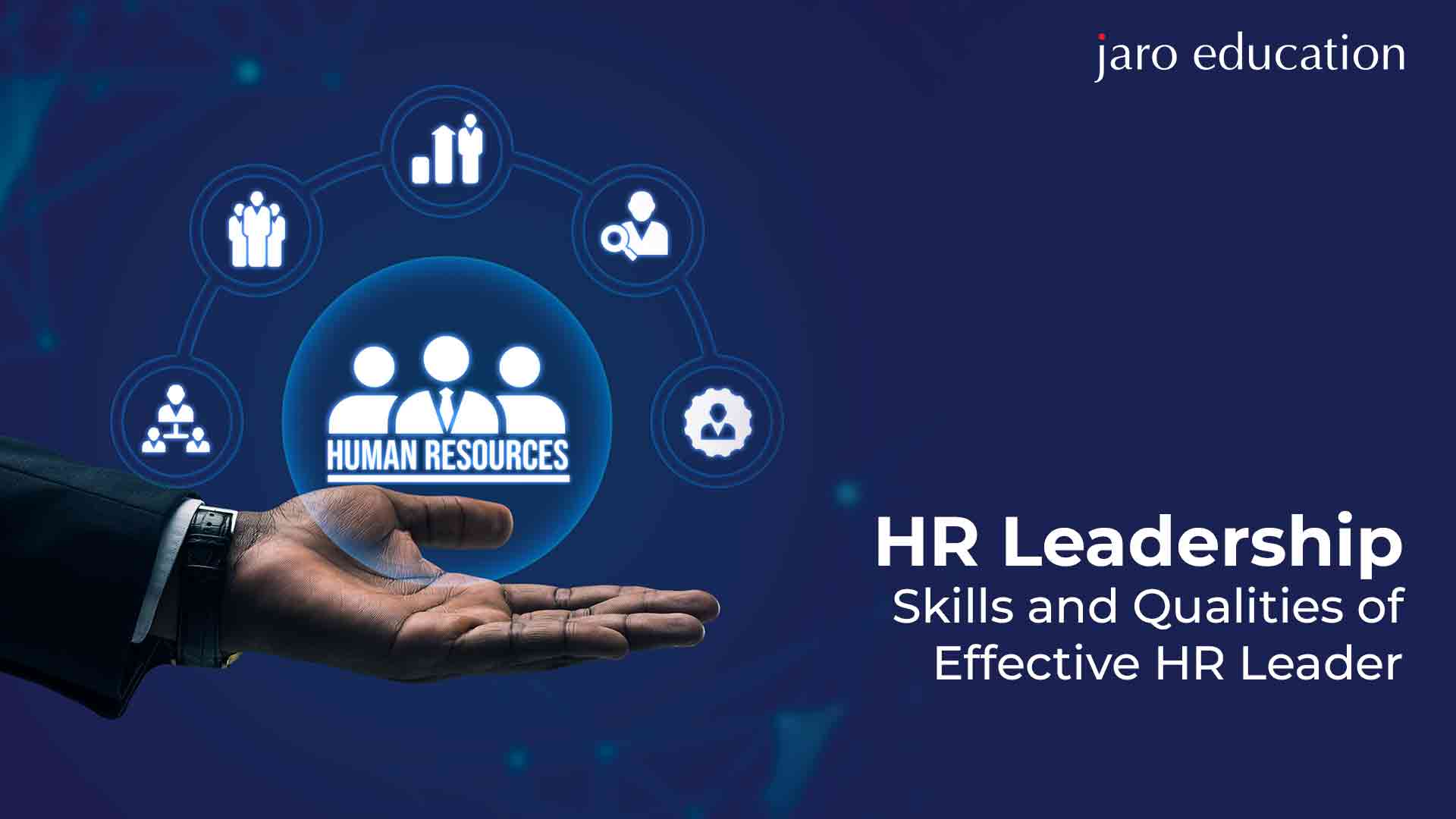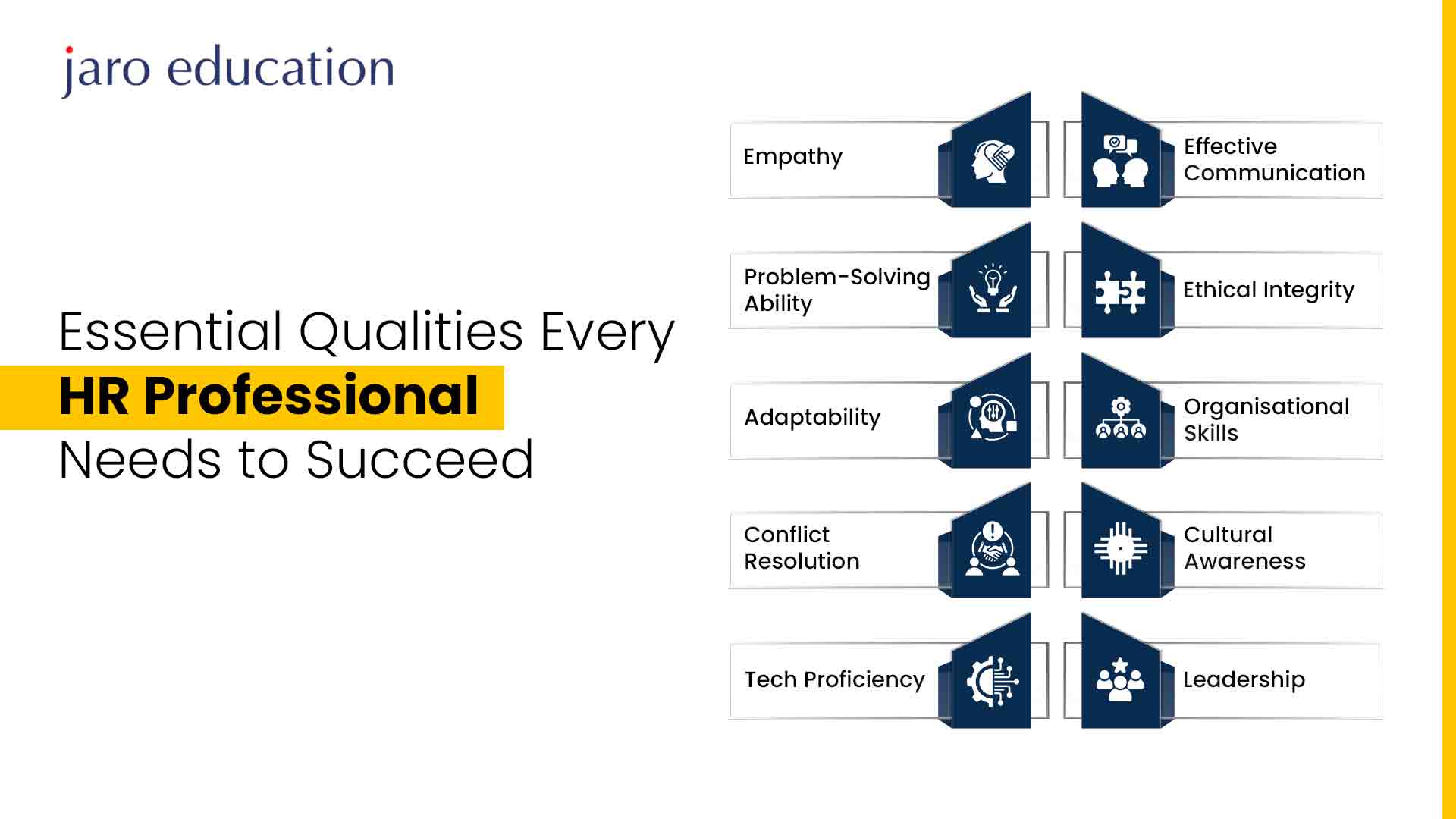HR Leadership: Skills and Qualities of Effective HR Leader
Table of Contents

- jaro education
- 18, October 2023
- 5:00 pm
In today’s rapidly changing business landscape, the role of human resource (HR) leaders has never been so vital. Managing personnel and cultivating team engagement are among the most substantial challenges that leaders face. To excel in this multifaceted role, HR leaders should possess a completely unique blend of management and soft skills.
If you’re someone who is looking forward to elevating your career in the field of Human Resources Management, the Executive Programme in Human Resource Management, a Programme by CEP, IIT Delhi is a transformative educational opportunity that empowers professionals with the essential skills required for HR excellence. This programme serves as a beacon guiding HR leaders toward a future defined by proficiency and innovation.
Values of a Successful HR Leader
Let’s explore the essential values that define a successful HR leader and drive their impact on organisations and employees alike.
Honesty and Integrity
One of the foundational pillars of powerful HR leadership is the exercise of honesty and integrity. HR leaders often find themselves in situations where they have to make essential decisions during moments of crisis or organisational change. While the temptation to withhold information may arrive, exceptional HR leaders recognise that transparency and honesty are essential for maintaining team morale and achieving overall success.
Establishing regular check-ins and open communication channels is instrumental in building trust among employees. Honest HR professionals create an environment where teams can openly discuss changes, potential challenges, and concerns. Furthermore, they provide reliable communication channels through which employees can voice their opinions and seek guidance when needed.
Fostering a Culture of Development
One of the key differentiators between exceptional HR leaders and other HR professionals is their genuine commitment to developing others. This extends beyond simply recruiting and hiring talent. Exceptional HR leaders act as coaches and mentors, providing constructive feedback and guidance to employees at all levels of the organisation.
Neglecting workforce development can lead to a loss of talent and disengagement. Employee retention becomes even more crucial in an era in which remote work is prevalent. A strong HR department can play an essential role in employee engagement strategies, helping organisations attract and retain top talent.
Influencing and Building Relationships
The role of an HR leader has gone through an evolutionary change in recent years. Instead of focusing entirely on HR functions and attrition rates, HR professionals are now expected to be strategic partners who contribute to an organisation’s overall business strategy. Building strong relationships with senior management is crucial for achieving this partnership.
Effective communication is a part of HR skills like conflict management skills, which are important for HR leaders at all levels in the organisation. HR leaders must convey the message that employees are integral to business success. This includes harnessing their technical abilities to increase diversity and inclusion initiatives and labour relations that attract, retain, and develop top talents.
The Power of Empathy in People Management
Empathy is an often underestimated leadership skill. While strategic thinking and change management are highly regarded in the business world, empathy performs an essential role in inspiring and empowering a team. Understanding and empathising with employees’ perspectives can inspire the team to achieve better results.
Putting oneself in the shoes of an employee is not a “soft skill”; it’s a valuable management trait. By empathising with their team members, HR leaders can create a supportive and nurturing environment for work that encourages employees to excel.
Application and Development of Functional Knowledge
Exceptional HR qualities consist of functional knowledge relevant to their specific organisation, industry, and role. This includes expertise in employment law, regulatory changes, and other industry-specific knowledge. HR leaders offer vital guidance and information, ensuring that employees are informed about labour laws, benefits, reimbursement, and other policies.
What sets great HR leaders apart is their attitude toward functional knowledge development and its strategic application. They constantly analyse and stay updated through professional development and industry best practices. This dedication allows them to make a positive impact on organisational objectives.
Qualities of an HR Professional
The fundamental HR qualities and skills make HR professionals invaluable assets in the world of modern business. Here are the most vital qualities that an HR professional should possess.
Mastering the Basics
Great HR leaders are not only well-versed in the fundamentals of human resources but also constantly attempt to expand their knowledge. HR professionals must have expertise in areas consisting of labour laws, benefits, compensation, medical and family leave policies, and other vital HR guidelines. However, in today’s dynamic work environment, successful HR leaders also delve into areas like organisational psychology, employee engagement strategies, and diversity, equity, and inclusion (DE&I) best practices.
Embracing Data
The integration of technology and data-driven decision-making has become increasingly vital in HR leadership. HR leaders have to leverage technology to streamline and enhance HR techniques. With more organisations adopting remote and hybrid work structures, the reliance on Software as a Service (SaaS) technologies has soared.
Being Innovative and Strategic
In the current HR landscape, HR leaders ought to be innovative and strategically minded. These skills enable them to quickly change situations and shape the organisation’s culture effectively. Design thinking, which applies design principles to human behaviour, is one approach that HR leaders can utilise.

The Evolution of the Modern HR Leader
HR leadership has evolved considerably in recent years, with HR leaders facing new roles and expectations. Today’s HR leaders must be completely engaged with the present, investing their efforts in creating positive cultures, engaging employees, and optimising results. This method ensures long-lasting success and relevance in the ever-evolving world of work.
Skills a Great HR Leader Needs
On an individual level, here are some of the most critical HR skills that make an excellent leader:
Agility
An effective HR leader should be forward-thinking and open to new ideas. They ought to be flexible and capable of adjusting policies and strategies as needed to stay current with technological trends and industry shifts.
Empathy
In a profession focused on people, emotional intelligence and empathy are invaluable abilities. HR leaders should apprehend and relate to the needs, issues, and emotions of employees.
Problem-Solving
Every day, HR leaders face unique challenges, whether it is resolving conflicts between employees or tackling complicated organisational strategy issues. Effective problem-solving abilities are essential for finding innovative solutions.
Communication
HR is one of the few departments that interacts with nearly every member of the organisation. Effective communication, active listening, and transparency are key to building trust while preventing misunderstandings.
Ethics
HR leaders are entrusted with confidential data and sensitive information. Maintaining high ethical standards and implementing the latest security practices is paramount to protecting this information and upholding the organisation’s reputation.
Wrapping Up
In the ever-evolving landscape of HR management, exceptional leaders possess a unique blend of qualities and skills. They prioritise honesty, integrity, motivation, continuous learning, and fostering a culture of development.
Additionally, they excel in building relationships, demonstrating empathy, and applying functional knowledge. These attributes, coupled with individual talents, together with agility, problem-solving, communication, and ethics, contribute to the success of HR leaders in the new world of work.
Those who embrace these qualities and skills will play a crucial role in shaping the future of organisations and their employees. If you’re looking forward to being a part of the Executive Programme in Human Resource Management at CEP, IIT Delhi to upskill your HR qualities, you can get in touch with Jaro Education’s admission experts to learn more. This transformative programme stands as a valuable partner in the journey of HR leaders towards achieving excellence and making a lasting impact on their organisations.






